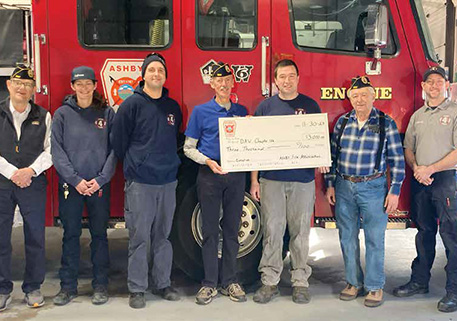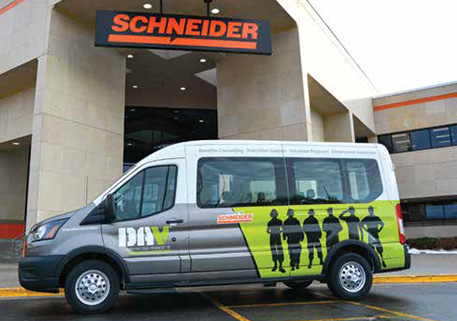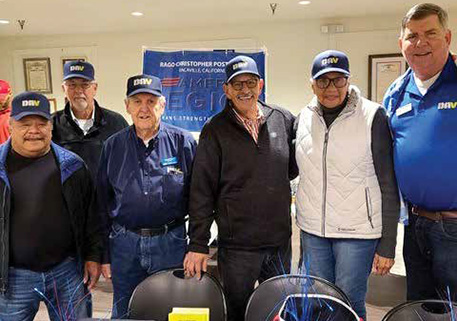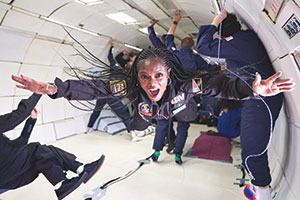
Paralyzed Army veteran takes zero-gravity flight as part of mission to make space more accessible
Centra “Ce-Ce” Mazyck used to sit on her back porch and gawk at the stars. She’d wonder what was out there in the vast night sky, light-years away.
She doesn’t want to wonder anymore. She wants to find out for herself.
The Paralympian and Army veteran caught the space travel bug on a recent mission led by AstroAccess, an organization working to make the cosmos more accessible for people with disabilities. Mazyck was paralyzed from the waist down during a jump training accident while serving in the 82nd Airborne Division at Fort Bragg, North Carolina, in 2003. The former paratrooper is a life member of DAV and a recipient of the Freedom Award, presented during the annual National Disabled Veterans Winter Sports Clinic, which honors outstanding courage and achievement in a veteran’s rehabilitation process.
On Oct. 17, Mazyck was one of 12 people with disabilities—including a fellow veteran, scientists, artists and engineers—to board a zero-gravity flight in Long Beach, California. Sponsored by DAV, the group was tasked with testing the limits of spaceflight.
“It was the best experience ever,” Mazyck said. “I would do it over and over and over again.”
The plane, operated by the Zero Gravity Corp., flew a series of parabolic arcs to mimic the weightlessness of space. Ambassadors moved from their seats to a padded portion of the cabin where they floated, free from the confines of gravity. The sensation is unlike anything else, ambassadors say, but there’s a reason the plane is affectionately called the “vomit comet.”
“I did several backflips and things like that,” Mazyck said. “And I had to stop. I said, ‘Let me stop before I get sick.’”
During the brief intervals without gravity (or nausea), ambassadors experimented with prototypes designed to address communication and safety challenges for people with disabilities. Solutions included everything from handles and strapping systems to GPS technology that helps people who are deaf or blind navigate their environment.
“We want to be independent when we’re taking these flights,” Mazyck explained. “So the more we take these flights and the more we have retrofitted things on the aircraft to get us acclimated, then the more independent we will be.”
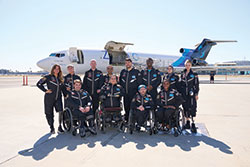

Historically, people who have a disability have been excluded from cosmic adventures. NASA astronauts must have 20/20 vision (with or without corrective lenses), have a standing height between 62 and 75 inches, and pass a long-duration flight physical. Everything from space suits to spacecrafts were designed for people who meet the agency’s demanding requirements.
Ann Kapusta, mission director for the AstroAccess flight, said the traditional idea of who can be an astronaut is being challenged more and more. Earlier this year, the European Space Agency announced its plan to recruit at least one astronaut who has a disability.
“So there are ways that spaceflight is becoming more accessible,” Kapusta said. “Our mission with AstroAccess is really to push that boundary all the way to the extreme.
“If they can make space accessible, we can make any space accessible,” she added. “And if we can solve the challenges of spaceflight, there’s no reason that we can’t do it here on Earth.”
Military veterans such as Mazyck and fellow AstroAccess ambassador Azubuike “Zuby” Onwuta are well equipped for such a lofty mission. Onwuta, an innovator and Army veteran who is blind, explained that both the military and space worlds require discipline, reliability and the spirit to tackle unchartered territory.
“Our nation’s veterans have a steadfast drive to serve that strengthens our communities here on Earth every day,” said National Adjutant Marc Burgess. “The AstroAccess mission gives DAV advocate Ce-Ce Mazyck and others the opportunity to help make space a better, more inclusive venture. Such groundbreaking work will benefit the disabled community and humanity well into the future.”
Mission ambassadors will continue to provide feedback and engage the public about space accessibility. The ultimate goal for AstroAccess is to send one or more team members to space.
“I want to experience that,” Mazyck said. “I want to see how it looks and want to see how it feels so I can come back and share.
“Disabled individuals, we can do this if we have our supporters, if we believe in ourselves and keep doing the research.”

